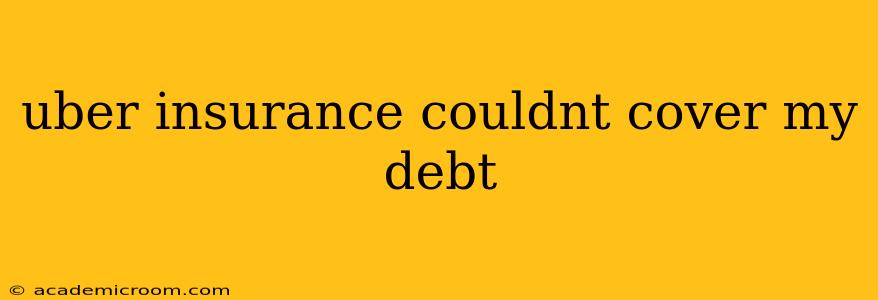Facing a significant debt after an accident while using a rideshare app like Uber can be incredibly stressful. Many drivers and passengers assume their Uber insurance will cover all liabilities, but this isn't always the case. Understanding the limitations of Uber's insurance policies and exploring available options is crucial. This article will delve into common scenarios where Uber insurance might fall short, explore alternative solutions, and offer advice for protecting yourself financially in the future.
What Does Uber's Insurance Actually Cover?
Uber's insurance program is a multi-layered system designed to cover various situations. However, it's essential to understand that the coverage levels vary depending on the driver's status (online, offline, etc.) and the circumstances of the accident. Generally, Uber provides liability coverage, but the limits can be lower than a standard personal auto policy. It's also important to remember that Uber insurance primarily protects third parties involved in an accident. Coverage for the driver's own vehicle damage might be limited or require supplemental coverage.
Why Uber Insurance Might Not Cover Your Debt
Several reasons might explain why Uber insurance didn't cover your entire debt:
1. Exceeding Policy Limits:
Uber's liability coverage has limits. If your accident resulted in damages exceeding these limits, you would be personally responsible for the remaining debt. This is a significant concern, and understanding the policy's limits is crucial before ever accepting a rideshare trip.
2. Uncovered Damages:
Uber insurance might not cover all types of damages. For example, it may not fully cover:
- Property damage beyond the policy limits: Repair costs for extensive vehicle damage or property damage might significantly exceed the policy's limits.
- Personal injury beyond the policy limits: Serious injuries can lead to substantial medical bills and lost wages, easily surpassing the insurance coverage.
- Non-economic damages: Pain and suffering, emotional distress, and loss of consortium are often not fully covered by basic liability insurance.
- Uninsured/Underinsured Motorist Claims: If the other driver was at fault and uninsured or underinsured, your recourse might be limited, even if your own Uber insurance covered you.
3. Exclusions and Policy Violations:
Uber's insurance policy likely contains exclusions for specific circumstances. Driving under the influence of alcohol or drugs, violating traffic laws, or using the vehicle for unauthorized purposes could void or limit your coverage. Carefully review the terms and conditions of your policy to understand these limitations.
What Can I Do if Uber Insurance Didn't Cover My Debt?
If Uber insurance fell short, several options might be available:
- Review your personal auto insurance: Check if your personal auto insurance policy provides additional coverage, such as uninsured/underinsured motorist protection or supplemental liability insurance.
- File a claim with your own personal insurance: Even if you were working through Uber, your own insurance might still provide coverage. Depending on the specifics, your personal policy might cover the gaps left by Uber's insurance.
- Consult with an attorney: A personal injury attorney can assess your case, identify all potential sources of compensation, and guide you through the legal process. They can help negotiate settlements and represent you in court if necessary.
- Explore alternative funding sources: Consider options like personal loans, debt consolidation, or seeking financial assistance from family and friends.
How Can I Protect Myself in the Future?
To minimize future risks:
- Understand your Uber insurance policy: Thoroughly review the policy's terms and conditions to understand its limitations.
- Consider supplemental insurance: Purchasing additional liability insurance or uninsured/underinsured motorist coverage can provide better protection.
- Maintain a clean driving record: Avoid violations and accidents to avoid potential coverage issues.
- Always be aware of your surroundings: Safe driving practices significantly reduce the risk of accidents.
This information is for general knowledge and should not be considered legal advice. Always consult with a qualified professional for advice specific to your situation. Dealing with an insurance shortfall can be complex; seeking professional guidance is highly recommended.
